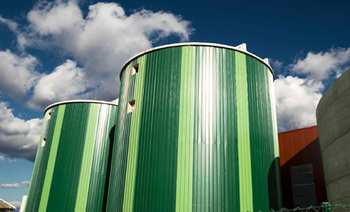German Climate Technology Initiative: Promoting climate-friendly biogas technology in Brazil (completed)
Project description
Title: Brazilian-German Project on energy from Biogas – PROBIOGAS (DKTI)
Commissioned by: German Federal Ministry for Economic Cooperation and Development (BMZ)
Country: Brazil
Lead executing agency: Brazilian Ministry of Cities
Overall term: 2013 to 2017
Context
In its Intended Nationally Determined Contribution, presented prior to the Paris climate conference (COP21) in December 2015, Brazil announced that it would expand its use of renewable energy beyond just hydro power. A major advance is the promise to increase the overall share of renewables other than hydo power in the electricity mix – including wind, solar and biomass – to at least 23 per cent by 2030. According to the Brazilian energy research company EPE, Brazil could produce 100 million cubic metres of biomethane per day from organic residues. This is twice the amount of natural gas imported in 2014. Despite the huge potential, the actual use of biogas still only contributes around 0.06 per cent of Brazil’s electricity output.
Objective
The use of biogas from various sources for the generation of energy has been initiated on a wide scale.
Approach
As part of the German Climate Technology Initiative, the project is improving the regulatory conditions for the use of biogas to generate electricity, or to substitute natural gas or diesel in Brazil. On behalf of the German Federal Ministry for Economic Cooperation and Development (BMZ), GIZ is working with the Brazilian Ministry of Cities to coordinate the inputs of relevant actors from the policy sphere, the public sector, industry, and the academic and research community. The aim is to utilise to the full the potential of biogas as an economical and renewable source of energy, and to open up new market opportunities. In close cooperation with the state and federal regulatory authorities in the energy and environment sectors, the project partners are working to fulfil the necessary environmental regulations and standards for the licensing of biogas plants, and for the feeding in of biogas-generated electricity into the grid and of biomethane (purified biogas) into the natural gas pipelines. Together with German and Brazilian universities and research institutions, the project is establishing a network of biogas laboratories which enhance the knowledge of substrates and technologies, adapted to Brazilian conditions.
Furthermore, the project is working with industry partners and with the Brazilian biogas associations, ABiogás and ABBM, to identify and promote the business case for producing and using biogas in the sanitation and agricultural sectors. It also carries out a number of capacity building activities, in particular with a focus on biogas generation from wastewater treatment, to increase energy efficiency in this sector.
Results
- In recent years, invitations to tender for biogas-based power generation projects by the regulatory authority ANEEL have opened up access to Brazilian funding worth BRL 476 million.
- Between 2014 and 2016, 15 multipliers attended training courses in Germany and Brazil on the generation of biogas during the treatment of wastewater. These people now provide their own training courses in their institutions.
- In January 2015, the Brazilian regulatory agency for oil, natural gas and biofuels, ANP, published a specification allowing biomethane produced from agricultural residues to be fed into the gas network and used as a vehicle fuel.
- In 2015 the Brazilian agricultural research company EMBRAPA launched a supraregional network of five biogas laboratories. These are equipped with a standardised measuring technology to determine the potential of various substrates for generating methane. The aim is to provide reliable data for feasibility studies.

- In March 2016, the Ministry of Cities explicitly included the use of biogas for energy in its standard for funding applications for wastewater treatment projects.
- In May 2016, a biogas project based on agricultural residues with a capacity of about 21 MW won an energy auction for the first time. The energy will be priced at EUR 70/MWh, and it will start producing electricity from 2021.
- In July 2016, ABiogás presented a proposal for a national biogas and biomethane policy to the Brazilian Minister of Mines and Energy.